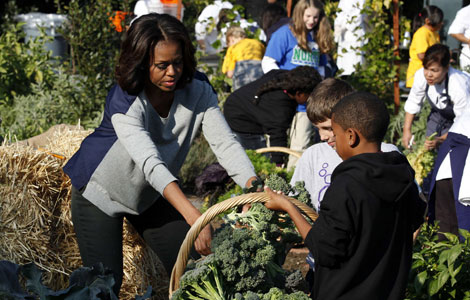US students compete in Chinese
Updated: 2013-11-01 07:39
By Deng XianlaiFor China Daily (China Daily USA)
|
||||||||
Nowadays, a Westerner speaking fluent Chinese probably won’t surprise anyone anymore, but what if he also spouts his knowledge of traditional Chinese scraping therapy or gives a concise and precise summary of a contemporary Chinese novel?
Jonathan Weinstein, an undergraduate student at the University of Virginia-Arlington, whose parents run a Chinese medicine clinic, not only knows traditional Chinese medicine by theory but also practices the scraping therapy when his roommate feels sick. Mark Schaefer of George Washington University can explain in a nutshell the plot of To Live, a 1993 novel by Chinese novelist Yu Hua.
Weinstein and Schaefer were among 16 competitors in the final round of the 2013 Jiangsu Cup Chinese Speech Contest held at the George Washington University’s Elliott School of International Affairs on Oct 27. Having been successfully held for the past two years, the contest is becoming a mature cultural exchange mechanism under the cooperation of Jiangsu International Cultural Exchange Center (JICEC), Institute of International Students of Nanjing University (IISNJU), Columbia College of Arts and Sciences of the George Washington University (CCASGWU), and Confucius Institute of the George Washington University.
Zhang Huanfa, deputy secretary-general of JICEC, considers the contest an opportunity for Jiangsu, an economic engine among Chinese provinces, to introduce itself to the world.
"Students are stunned by Jiangsu’s prosperity and its rich history and culture even though they have learned a thing or two about the province before they actually arrive there," Zhang said. "And these feelings of astonishment have been vividly recorded in their essays and diaries along the journey."
According to the organizers, the gold medalists in the contest will win either a scholarship for a two-year Master’s program at Nanjing University or a travel package to Jiangsu Province.
Roy J. Guenther, executive associate dean of CCASGWU, told China Daily during a break at the contest that the interest in studying Chinese language among their students continued to increase. "I can’t give actual numbers, but the reason I know it is increasing is that part of my job is to make sure that there are instructors available when the department needs more instructors for the various levels and sections, and they keep asking me for more, so I know that the students are out there," Guenther said.
In the Contest, each competitor gave an up-to-three-minute speech and an up-to-four-minute Q&A session in which he or she responded to questions from the panel of judges.
"I think what is impressive is not just the speeches that they practiced but their ability to handle the questions and answers which they don’t know before, and that requires a lot more than just broad language skills," said Dr. Scott G. McGinnis, an academic advisor and professor at Defense Language Institute, the US Defense Department’s educational and research institution that provides linguistic and cultural instruction to the Defense Department. Dr. McGinnis, who studied Chinese "with some degree of concentration" between 1978 and 1989 and who taught Chinese at the university level for 10 years, addressed the event.
Most of the finalists had no immediate connection to Chinese ethnicity. "Equally impressive is that these are not students that have necessarily had years and years of living in China," said McGinnis.
Samuel Gruber, a senior at UVA who ended up sharing the gold medal with Weinstein and Schafer, was preparing for an interview the following week with the Teach For China Program, which recruits university students from both China and the US to teach children in China’s undeveloped rural areas.
Having learned Chinese for six years and once lived with local people in Southwest China’s Yunnan Province, Gruber said, "Looking back on my experience, I really want to spend two years helping those people achieve what will otherwise be challenging for them," he told China Daily in Chinese.
This year’s contest also drew the attention of parents whose young kids were learning Chinese. Ayanna Mackins, whose six-year-old daughter, Madison McCauley, started learning Chinese at the age of two, said that it was really difficult for minimum-wage families like hers to afford Chinese language lessons.
"Most of the Chinese tutors in this area run anywhere from $40 to $75 an hour, so I go on the internet and try my best to look for opportunities for my daughter to be exposed to Chinese. And sometimes when we go to events, people see her and never expect this young African American child to know Chinese," said Mackins, who said her family was a regular subscriber to China Daily.
"My daughter is recognizing new Chinese characters every day from the newspaper," Mackins said, her daughter huddled beside her practicing Chinese characters on a reporter’s notepad.
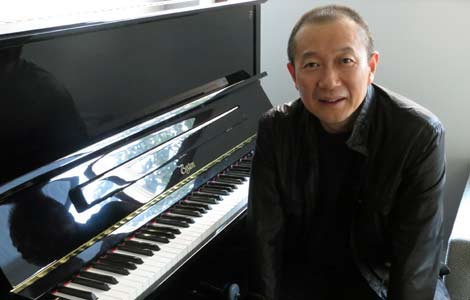
 Tan Dun premieres new work with Philadelphia Orchestra
Tan Dun premieres new work with Philadelphia Orchestra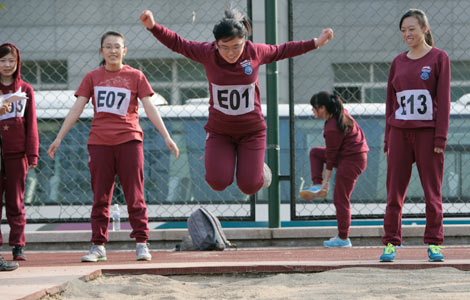
 Women fight to become China's next oceanauts
Women fight to become China's next oceanauts
 Two firms to debut in US at higher prices
Two firms to debut in US at higher prices History under a new light
History under a new light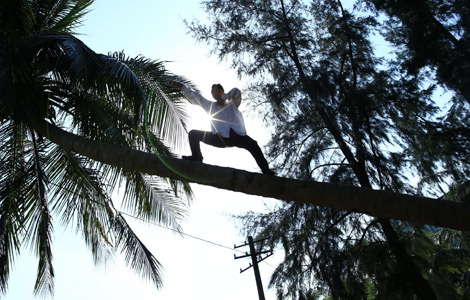
 Kung fu master becomes hit online
Kung fu master becomes hit online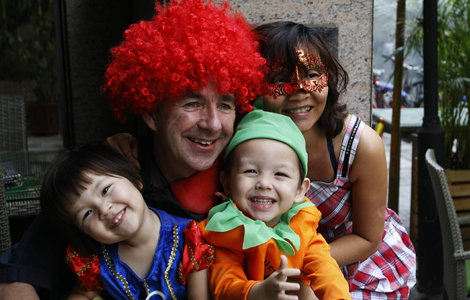
 Color-blind love
Color-blind love
 Lenovo's new secret weapon: Hollywood star
Lenovo's new secret weapon: Hollywood star
 Brussels visit heralds closer trade ties for EU and China
Brussels visit heralds closer trade ties for EU and China
Most Viewed
Editor's Picks

|

|

|

|

|

|
Today's Top News
China ‘urges’ US to explain phone taps
US students compete in Chinese
The Chinese dream in ink
'Dangerous provocation' condemned
Chinese investment in US still faces hurdles
Freer RMB 'can answer US claims'
Ministry opposes disclosure of WTO report
Obama calls for foreign investment
US Weekly

|

|


